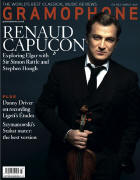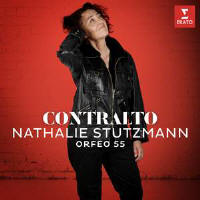Texte paru dans: / Appeared in: |
|
|
Outil de traduction (Très approximatif) |
|
|
Reviewer: Richard Wigmore In an age that set a premium on sheer vocal brilliance, female contraltos were routinely overshadowed by preening castratos and flutey sopranos. In Handel’s London they never enjoyed top billing. Yet as Nathalie Stutzmann reveals in her final collaboration with her own Orfeo 55, now sadly disbanded, their music can be just as dramatically vivid as their starrier colleagues’. Handel and Vivaldi – including his astonishing tone poem ‘Gelido in ogni vena’ from Farnace – are the obvious draws in Stutzmann’s celebration of the opera seria contralto. But their less revered Italian contemporaries barely suffer from the comparison. Outstanding among a handful of arias recorded here for the first time are a wistful pastoral by Caldara, evocatively coloured by flute and chalumeau, and a furious eruption of defiance from Porpora’s Statira. Stutzmann’s deep burgundy contralto, like a freakishly rich, wide-ranging countertenor, is the perfect fit for this repertoire. With her voice as firm and commanding as ever, she excels alike in the macho bravado of Goffredo’s ‘victory or death’ aria ‘Sorge nel petto’ (Rinaldo), the frenzied terror of Ramise’s ‘Sento il cor’ (Arminio) – a thrilling performance – and the elegiac tenderness of a siciliano from Gasparini’s La fede tradita. Stutzmann’s characterisation and vocal colouring are always true and specific. She also dares emotional extremes. Using Italian words as expressively as Cecilia Bartoli – some compliment – she hurls imprecations at her murderous former lover in Porpora’s Semiramide and veers between ferocity and fragile pathos as Asteria confronts Tamerlano in Vivaldi’s Bajazet. You’ll look far to find a more powerful characterisation of ‘Gelido in ogni vena’, voice and ice-cold strings challenging each other to new heights of anguish. Elsewhere Stutzmann alluringly fines down her sumptuous voice, whether in a graceful minuet aria from Bononcini’s Griselda or a gently sensuous performance of the Caldara. Vocal purists might point to moments where Stutzmann’s tone balloons in the heat of battle, or to some ‘squeezed’ phrasing in lyrical arias. She also lacks a true trill, a must-have in the 18th century. But this is to nitpick. Stutzmann brings resplendent vocalism and passionate conviction to each of her adventurously chosen arias, abetted by responsive and, where apt, combustible playing from her crack ensemble. Pleasure is further enhanced by a note from Suzanne Aspden that throws valuable light on the women who first played these assorted heroines and (occasionally) heroes in extremis. |
|




